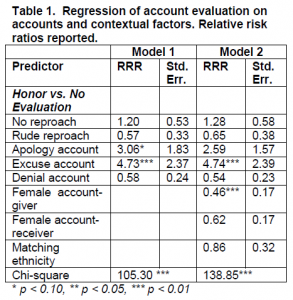Brian Reschke and Dr. Kristen B. DeTienne, Organizational Leadership and Strategy
Research Question
Misunderstandings, breaches of trust, and unmet expectations are frequent in the workplace. Accounts, or explanations of behavior, are often deployed by alleged offenders to reshape others‟ attributions regarding conduct. In recent years, scholars have returned to the question of how rifts in workplace relationships are ameliorated through accounts such as apologies, excuses, and denials. This area is identified with the relationship repair research domain (Dirks, Lewicki, & Zaheer, 2009).
Whereas apologies have been found successful in rectifying competence-based violations (Kim, Ferrin, Cooper, & Dirks, 2004), more external accounts (such as excuses) were found more effective in alleviating blame in matters of integrity (Kim, Dirks, Cooper, & Ferrin, 2006). Typically, this scholarly work has been concentrated within a laboratory research design in which the context of account episodes is highly controlled. The present study seeks to extend this research to a more natural research site and to explore whether the same general findings hold when accounting for the context in which accounts are solicited. We hypothesized that on average, apologies would be most effective in securing positive evaluation outcomes, even when accounting for contextual factors.
Analytic Procedures
This study employed secondary survey data collected by Braaten, Cody, and DeTienne (1993). Five hundred employees at a major financial services firm in the western U.S. were asked to describe experiences in which they had to explain themselves (the „account giver‟) to another employee (the „account receiver‟). The instruments used to solicit responses were relatively simple, accommodating diverse impression management motivations.
Open-ended responses were previously coded according to the style of the account receiver “reproaching” or soliciting the account (rude or hostile, polite or direct, no reproach), the account type used (apology, excuse, justification, denial), and the evaluation outcome of the episode (honor [accepted], reprimand, retrain, reject, no evaluation). Additional data coding examined whether a substantive breach was in question. Of the final sample (N=346), 59% of account-givers were female, 53% had worked at the company for four years or less, 67% reported the episode occurred within the past three months, and 83% reported the incident occurred at their current job.
Due to the categorical nature of the dependent variable (account evaluations), multinomial logistic regression was used. The first model regressed account evaluations on account types and reproach styles; the second model included additional contextual control variables, namely gender of account giver, gender of account receiver, and an indicator of whether both parties were of the same ethnicity.
Results
Table 1 presents the results for part of the models (the full results, which require a comparison of each evaluation type to the base outcome of „no evaluation‟, were too lengthy to be included in this report). Consistent with previous research, apologies are positively associated with accounts being honored (accepted); however, when controlling for contextual variables such as gender and ethnicity, this positive effect is no longer statistically significant. Contrary to expectations of the literature, excuses proved most effective in resulting in account honoring. Our results serve to qualify the general findings in the accounts literature and call for more consideration of context. An unexpected result was a significant negative effect (indicated by a relative risk ratio of less than 1) for female account givers. On average, the odds of a female‟s account being honored (compared to receiving no evaluation) are 46% of the odds of a male‟s account being honored, controlling for the other variables.
Challenges and Lessons Learned
With increased methodological training, I have since become aware of some challenges to our results. While the secondary data we are considering are rich in detail and are derived from real-life experiences, our study faces the criticism of exhibiting self-report bias. Since cases were generated from respondents‟ memory, it is difficult to distinguish whether the results reported above reflect „typical‟ account episodes, extreme or memorable cases, or rose-colored revisions. For example, are successful apologies more easily remembered and reported than unsuccessful apologies?

This critique threatens our initial approach of testing whether the effects of accounts hold up when controlling for contextual variables. Above, we report that when gender is considered, the positive effects for apologies become statistically insignificant. But does the negative effect of females versus males reporting indicate a general gender effect, or a systematic bias of males to remember experiences more favorably? Controlling for additional factors may lend our findings some improved credibility, but we are left to defend whether self-supplied scenarios serve as a fair „test‟ of accounts in context.
An additional, theoretical problem concerns the broad scope of the research question. Although the study samples widely across the variety of transgressions and the outcomes transgressors may pursue with their accounts—rather than concentrate solely on trust restoration, for example—this expansion distances our study from previous research. We lack similarity in measures and research design that would make our study a partial replication of earlier work.
Accordingly, while the analysis is complete, our study presently faces several obstacles to exhibiting this research in the broader academic community. A complete reframing of the paper would be warranted, perhaps positioning it as an exploratory study to preface later lab research. Alternately, the qualitative richness of the data could be exploited in grounded theory development.
This project constitutes one of my first experiences with academic research; I have learned it can be immensely challenging to find a proper angle to a paper once its limitations are more fully acknowledged. I admittedly had difficulty balancing the demands of this project, senior-year course work, and necessary preparations for graduate school. The ORCA grant assisted in supplementing other limited resources allocated to this project, as well as in funding work over the recent summer and current semester. I am grateful to my mentor for making this experience possible.
